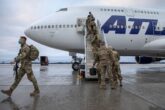August 09, 2021
The Taliban has seized more cities, despite U.S. efforts to build a strong Afghan military. What happened?
On Sunday, the Taliban claimed the northern city of Kunduz, freeing dozens of Taliban fighters from the city prison. As U.S. troops continue to withdraw from Afghanistan, the Taliban is seizing regional capitals, advancing toward Afghan cities such as Kandahar and Herat, and gaining “strategic momentum.” And in July, President Biden announced the formal end of the U.S. combat mission in Iraq but added that the United States would continue to “train” and “assist” Iraqi security forces.
The United States has spent billions of dollars and the better part of two decades trying to organize, train, equip, advise and assist the Afghan National Army and the Iraqi Army, along with other Afghan and Iraqi security forces.
U.S. security assistance fails when U.S. influence fails.
The United States rarely initiates large-scale security force assistance projects in countries governed by political and military leaders who are highly motivated to build better militaries. Researchers point out that leaders facing societal upheaval, insurgency and civil war often prioritize preventing coups, consolidating political power, personal enrichment or personal survival above the strength of their nation’s military.
In practice, this means that instead of taking steps to strengthen their militaries, leaders may promote loyal officers rather than competent ones, ignore or encourage corruption and neglect or discourage rigorous training. They might welcome huge infusions of cash, equipment and assistance from the United States, while simultaneously ignoring U.S. advice and implementing policies that keep their militaries weak.
Fundamentally, then, the core challenge of security assistance for the United States is the challenge of influence. The United States builds better militaries when recipient leaders take U.S. military advice along with U.S. assistance — and U.S. security assistance fails when U.S. influence fails.
Read the full article and more from The Washington Post.
More from CNAS
-
Afghanistan: Why Does Trump Want to Retake Bagram Air Base?
Lisa Curtis, senior fellow and program director at the Center for a New American Security joined Deutsche Welle to discuss President Trump's comments on the U.S. regaining con...
By Lisa Curtis
-
A Failure to Plan: Examining the Biden Administration’s Preparation for the Afghanistan Withdrawal
Afghanistan, Iraq, and Vietnam. One failure is a horrible accident; two failures are a tragic coincidence; three failures are a disturbing trend that shows the U.S. government...
By Christopher D. Kolenda
-
Against All Odds
Eighteen months after taking power, the Taliban is intensifying its repression of Afghan civil society and cracking down on the rights and freedoms of all Afghans, especially ...
By Lisa Curtis, Annie Pforzheimer & Jan Mohammad Jahid
-
To Help Afghanistan, Engage Its Political Opposition
The effort to help Afghans shape a better alternative should begin now....
By Richard Fontaine & Lisa Curtis




